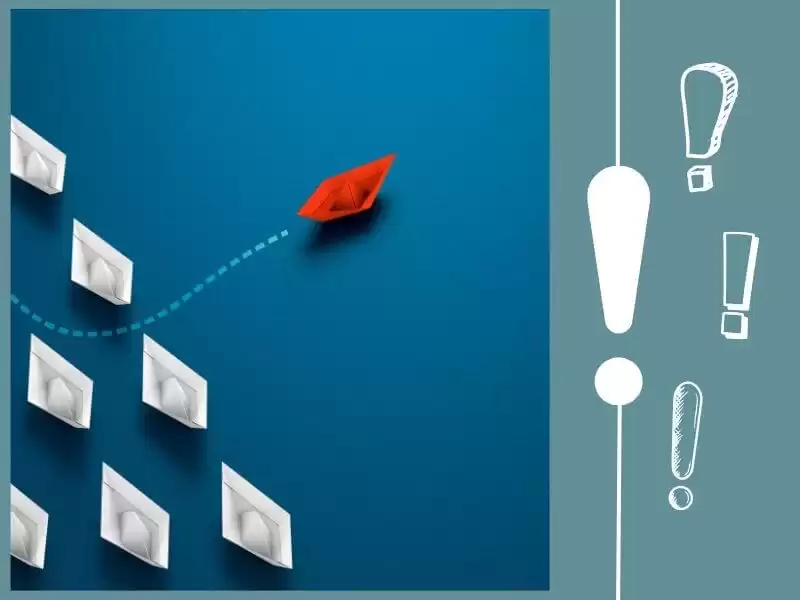
What are the most common mistakes that prevent you from achieving the desired income? Do you want to correct them? Andreja Fazlić brings the last five out of ten common mistakes in marketing that can seriously harm business. In addition to identifying problems, the second part of the article on the mistakes that destroy your business provides practical tips for correcting these mistakes, from automation to better integration within teams.
We continue where we left off. Five more of the most common marketing mistakes that can harm your business are waiting to be discovered.
The world of marketing is complex and constantly changing. To be one step ahead of the competition, it is crucial that you recognize and correct potential failures. You can read the first part of the article here.

Mistake 6 – Not nurturing your potential customers
Let's assume that you have made certain optimizations regarding attracting new leads and are now getting more of them. How do you take care of them? Do you care for them at all?
Most users won't be ready to buy immediately, and it's up to you to remind them anyway and/or continue interacting with them. Even after they leave your website or point of sale! This is called care of potential customers, i.e. lead nurturing, and serves to guide potential customers towards purchasing. A large part of these activities can be automated using the appropriate technology.
Lead nurturing implies adequate, personalized and educational content and activities during the sales process. Hence, potential customers feel more secure and comfortable interacting with your company. After the purchase, this care is transferred to customer service.
To get around this oversight, you should:
- Define different lead nurturing scenarios that align with your sales process.
- Create personalized e-mails and content adapted to your leads' needs and interests at different stages of their sales process.
- Automate lead nurturing activities to optimize your own resources.
- Track results, iterate and adapt scenarios and content to ensure an outstanding user experience.
Lead nurturing is one of the key segments of your marketing and sales strategy and helps you convert more leads.
Mistake 7 – You focus exclusively on one type of campaign
In the early days of digital marketing, companies often relied only on web traffic campaigns. However, changes in consumer habits and user journeys over the years indicate the need for a multi-functional approach. Depending on one type of campaign can lead to missing out on key opportunities. For businesses to be successful, they should consider different types of campaigns and adjust and improve based on results.
Campaigns to attract new customers, special methods of selling to specific customers (such as ABM), selling more products to existing customers and encouraging customers to talk about you are just some of the additional types of campaigns that would be good to practice. Choosing the right ones for your company will depend on your goals and budget.
To better target different types of campaigns, first look at what marketing tactics you're currently using. Then, consider other campaigns that could help you achieve your goals. Once you've decided what new tactics you want to use, develop a plan for how to introduce them or how to improve the ones you're already using. For your campaigns to be successful, it's important to constantly adjust them based on what you learn from their results.

Mistake 8 – Your existing customers are left to fend for themselves
Many companies neglect marketing activities to existing customers, which is a serious omission considering that these customers are already in favour of them. There is already a foundation of trust and a sense of connection.
If a customer has already chosen your company over a competitor, and if you offer a quality product or service, that customer is very likely to be inclined to buy from you again.
Surprisingly, various surveys show that most customers are not familiar with all the products or services of their favourite brands. Don't let the same thing happen to your customers. Take the opportunity to promote your offers to existing customers.
If you recognize yourself in this description, you can fix the situation in the following way:
- Revise your existing marketing strategy, including tactics, activities and messages tailored to existing customers.
Design new and even exclusive campaigns for them, such as:
- E-mail marketing campaigns with new offers, educational content and/or news.
- Raffles and contests with which you can thank existing customers for their loyalty and encourage them to make additional purchases.
- Cross-sell and up-sell campaigns through which you can present complementary products or services.
- Ambassador campaigns where you offer exclusive content or discounts to your existing customers to encourage them to promote you within their community.
- Continuously monitor results, test and adjust your approaches.
By marketing to existing customers, you can significantly increase your revenue and deepen your relationships with them.
Mistake 9 – When marketing goes on two different tracks
In many companies, wrong thinking prevails; they consider marketing and sales to be two separate entities, each responsible for generating revenue. In reality, your customers don't differentiate between your departments, and they don't care how you perceive them.
Their outstanding customer experience is key for them, whether it's interacting with marketing, sales or any other department, especially when they become your customers.
To get one step closer to creating an outstanding user experience, consider the following:
- Stop viewing marketing, sales and customer service as separate departments. Instead, form one team - the revenue generation team.
Some examples of how collaborations between former departments can work:
- "Marketing and sales" can together create a profile of the ideal client and develop efficient customer journeys.
- "Marketing and Customer Service" can create educational materials to inform potential customers.
- "Sales and Customer Service" can follow potential customers together and support them during their purchasing decisions.
- Focus all activities on providing an exceptional customer experience throughout the customer journey.
- Set common goals and KPIs for your team.
- Develop and implement a strategy to achieve these goals.
- Continuously monitor and adjust your approach based on the results achieved.
Align all three functions to deliver an outstanding user experience and maximize revenue.

Mistake 10 – Not enough focus on metrics
In the world of marketing measurement and data analysis, most companies can often fall into one of two categories:
- A group that measures absolutely everything but gets lost in many numbers without real understanding.
- A group that avoids measurement and relies on intuition.
Considering the complexity and dynamism of modern marketing, it is essential to regularly measure activities, interpret the results and adjust the strategy based on this knowledge.
If you belong to one of these two groups, you can get around this problem by using specialized tools and platforms such as Google Analytics, CRM systems and various dashboards that facilitate monitoring and analysis.
Start by defining key metrics for each tactic, activity, and campaign. After that, implement a system that will allow you to continuously monitor those metrics. Regularly analyse the collected data and look for information that can lead you to improvement. Constantly test and adjust campaigns based on the feedback received to achieve the best possible results.
It's important to understand that tools are not the end but the means to help you uncover hidden insights in your data. Based on this knowledge, you can make informed decisions.
The world of marketing is constantly and rapidly changing. What was effective in 2020 may not be applicable in 2024. But, tracking and analysing your marketing activities will lay a solid foundation for achieving your marketing goals.
Now that we've walked through each of these mistakes together, I hope you've found valuable insights and ideas that will shape your future strategy. Marketing combines art and science, and while the marketing world is constantly changing, authenticity and customer focus remain the key.
Every mistake is an opportunity to learn. Refresh your strategy, correct identified flaws and step boldly towards your marketing excellence.
Categories of trends
- News
- Sale
- Marketing
- SEO
- Web design
- Social media
- Technology
- Regulations
- Management
- Education
- Finances
- User experience
Newsletter
Sign up for the newsletter and receive the latest trends and tips straight to your inbox




